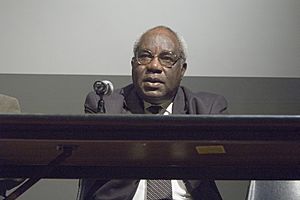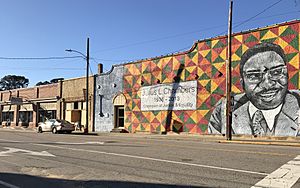Julius L. Chambers facts for kids
Quick facts for kids
Julius L. Chambers
|
|
|---|---|

Julius Chambers at the University of North Carolina at Chapel Hill, February 13, 2007
|
|
| Born |
Julius LeVonne Chambers
October 6, 1936 |
| Died | August 2, 2013 (aged 76) |
| Alma mater | North Carolina Central University, University of Michigan, University of North Carolina School of Law, Columbia University Law School |
| Organization | NAACP Legal Defense Fund |
| Movement | Civil Rights Movement |
Julius LeVonne Chambers (born October 6, 1936 – died August 2, 2013) was an important American lawyer, civil rights leader, and teacher. He fought for fairness and equal rights for all people. His work helped change laws and make society more just.
Early Life and Education
Julius Chambers grew up in rural Montgomery County, North Carolina. This was during the Jim Crow era, a time when laws kept Black and white people separate. These laws also treated Black people unfairly.
When Julius was 12, his father's auto repair business faced a problem. A white customer refused to pay, and no lawyer would help his father because he was Black. This unfairness made Julius decide to become a lawyer. He wanted to help end segregation and discrimination.
In 1954, Julius finished high school. This was the same month the famous Brown v. Board of Education ruling happened. This ruling said that separate schools for Black and white children were illegal.
Julius then went to North Carolina Central University. He was the student body president and graduated with top honors in history in 1958. He also earned a graduate degree in history from the University of Michigan.
In 1959, Chambers started law school at the University of North Carolina at Chapel Hill. He was the first African American to be the editor of the school's law review. He graduated first in his class of 100 students in 1962. He also became the first African American to join the Order of the Golden Fleece, a high honor at the university. In 1964, he earned another law degree from Columbia University Law School.
During this time, from 1963 to 1964, Julius Chambers worked as the first intern for the NAACP Legal Defense Fund (LDF). He was chosen by Thurgood Marshall, who later became a Supreme Court Justice.
Career Highlights
Law Practice in Charlotte
In June 1964, Julius Chambers started his own law office in Charlotte, North Carolina. This firm later became the first law firm in North Carolina with both Black and white lawyers working together.
With partners James E. Ferguson II and Adam Stein, and lawyers from the LDF, his firm won many important cases. These cases went all the way to the Supreme Court of the United States. They helped shape American civil rights laws.
Some key cases included:
- Swann v. Charlotte-Mecklenburg Board of Education (1971): This case supported school busing to help integrate schools.
- Griggs v. Duke Power Co. (1971) and Albemarle Paper Co. v. Moody (1975): These cases fought against unfair job practices based on race.
Chambers and his firm faced violence because of their work. In January 1965, his car was bombed. In November 1965, his home was bombed, along with the homes of other Black leaders. These bombings happened during the first hearings of the Swann school busing case. No one was hurt, but the events received national news coverage. In February 1971, his law office was also firebombed.
After retiring as chancellor of North Carolina Central University in 2001, Chambers returned to private law practice with his firm.
Leading the NAACP Legal Defense Fund

In 1984, Julius Chambers moved to New York City to lead the NAACP Legal Defense and Educational Fund (LDF). He became its Director-Counsel, the highest executive position.
Under his leadership, the LDF worked on many important cases. These cases covered areas like education, voting rights, capital punishment, employment, housing, and prisons. The LDF was well-known for defending affirmative action programs during the 1970s and 1980s. These programs aimed to help make up for past discrimination.
Career as an Educator
Julius Chambers also had a busy career as a teacher and professor. In 1993, he left New York and the LDF to return to North Carolina. He became the chancellor of his old university, North Carolina Central University.
As chancellor, he helped the university raise $50 million for improvements. He also created the first special teaching positions funded by donations. He served as chancellor until June 30, 2001.
Chambers also taught at many law schools, including Harvard Law, University of Virginia Law School, University of Pennsylvania Law School, Columbia University Law School, and University of Michigan Law School. He was also a distinguished professor at North Carolina Central University.
In his later years, Chambers worked as a law professor and directed the Center for Civil Rights at UNC School of Law.
Personal Life
Julius Chambers was married to Vivian Giles Chambers. They had two children, Derrick and Judy, and three grandchildren. He was a member of the Alpha Phi Alpha fraternity. His wife, Vivian, passed away in 2012. Julius Chambers died on August 2, 2013, at age 76, after several months of poor health.
Honors and Legacy
Julius Chambers Highway
In 2018, a four-mile section of Interstate 85 in Charlotte was named the Julius Chambers Highway. This honor recognized his important contributions.
Julius L. Chambers High School
In 2020, Vance High School in Charlotte was renamed Julius L. Chambers High School. The school's previous name honored a Confederate soldier. The new name celebrates Julius Chambers's legacy as a civil rights hero.
See also
 In Spanish: Julius L. Chambers para niños
In Spanish: Julius L. Chambers para niños
 | George Robert Carruthers |
 | Patricia Bath |
 | Jan Ernst Matzeliger |
 | Alexander Miles |

